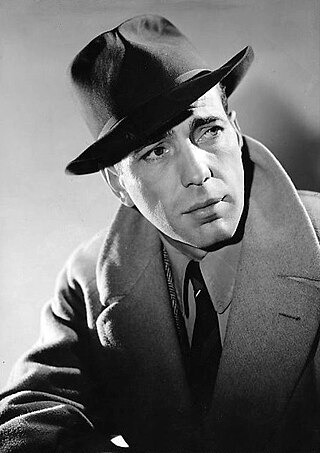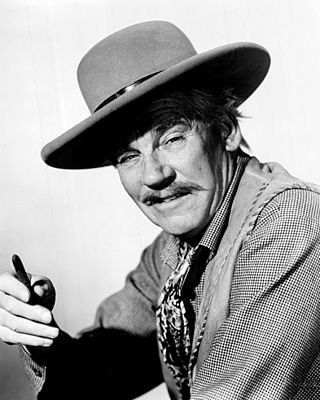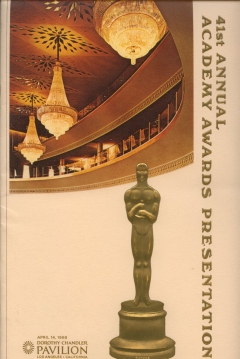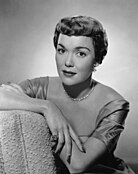
Humphrey DeForest Bogart, colloquially nicknamed Bogie, was an American actor. His performances in classic Hollywood cinema films made him an American cultural icon. In 1999, the American Film Institute selected Bogart as the greatest male star of classic American cinema.

John Marcellus Huston was an American film director, screenwriter and actor. He wrote the screenplays for most of the 37 feature films he directed, many of which are today considered classics. He received numerous accolades including two Academy Awards and three Golden Globe Awards. He also received a star on the Hollywood Walk of Fame in 1960 and the BAFTA Fellowship in 1980.

Walter Thomas Huston was a Canadian actor and singer. Huston won the Academy Award for Best Supporting Actor for his role in The Treasure of the Sierra Madre, directed by his son John Huston. He is the patriarch of the four generations of the Huston acting family, including his son John, grandchildren Anjelica Huston and Danny Huston, as well as great-grandchild Jack Huston. The family has produced three generations of Academy Award winners: Walter, his son John, and granddaughter Anjelica.

The 42nd Academy Awards were presented April 7, 1970, at the Dorothy Chandler Pavilion in Los Angeles, California. For the second year in a row, there was no official host. This was the first Academy Awards ceremony to be broadcast via satellite to an international audience, though outside North America, Mexico and Brazil were the only countries to broadcast the event live.

The 41st Academy Awards were presented on April 14, 1969, to honor the films of 1968. They were the first Oscars to be staged at the Dorothy Chandler Pavilion, Los Angeles, and the first with no host since the 11th Academy Awards.
The 27th Academy Awards were held on March 30, 1955 to honor the best films of 1954, hosted by Bob Hope at the RKO Pantages Theatre in Hollywood with Thelma Ritter hosting from the NBC Century Theatre in New York City.
The 32nd Academy Awards ceremony was held on April 4, 1960, at the RKO Pantages Theatre, to honor the films of 1959.
The 23rd Academy Awards were held on March 29, 1951, honoring the films of 1950. All About Eve received a record 14 nominations, besting the previous record of 13 set by Gone with the Wind in 1939. It won six Oscars, including Best Picture, and earned writer/director Joseph L. Mankiewicz his second consecutive Best Director and Best Adapted Screenplay awards, the only time such a feat has been accomplished.
The 24th Academy Awards were held on March 20, 1952, honoring the films of 1951. The ceremony was hosted by Danny Kaye.
The 36th Academy Awards, honoring the best in film for 1963, were held on April 13, 1964, hosted by Jack Lemmon at the Santa Monica Civic Auditorium in Santa Monica, California. This ceremony introduced the category for Best Sound Effects, with It's a Mad, Mad, Mad, Mad World being the first film to win the award.
The 34th Academy Awards, honoring the best in film for 1961, were held on April 9, 1962, hosted by Bob Hope at the Santa Monica Civic Auditorium in Santa Monica, California.
The 29th Academy Awards were held on March 27, 1957, to honor the films of 1956.
The 16th Academy Awards were held on March 2, 1944, to honor the films of 1943. This was the first Oscar ceremony held at a large public venue, Grauman's Chinese Theatre, and the first ceremony without a banquet as part of the festivities. The ceremony was broadcast locally on KFWB, and internationally by CBS Radio via shortwave. Jack Benny hosted the event, which lasted one hour and 42 minutes. This was the first ceremony to welcome admissions from the general public.
The 17th Academy Awards were held on March 15, 1945 at Grauman's Chinese Theatre, honoring the films of 1944. This was the first time the complete awards ceremony was broadcast nationally, on the Blue Network. Bob Hope hosted the 70-minute broadcast, which included film clips that required explanation for the radio audience.
The 18th Academy Awards were held on March 7, 1946, at Grauman's Chinese Theatre to honor the films of 1945. Being the first Oscars after the end of World War II, the ceremony returned to the glamour of the prewar years; notably, the plaster statuettes that had been used during the war were replaced by bronze statuettes with gold plating and an elevated base.

The 30th Academy Awards ceremony was held on March 26, 1958, to honor the best films of 1957.
The 19th Academy Awards were held on March 13, 1947, honoring the films of 1946. The top awards portion of the ceremony was hosted by Jack Benny.
The 6th Golden Globe Awards, honoring the best in film for 1948 films, were held on March 16, 1949.

The Treasure of the Sierra Madre is a 1948 American Western film written and directed by John Huston. It is an adaptation of B. Traven's 1927 novel of the same name, set in 1925, and follows two downtrodden men who join forces with a grizzled old prospector, in searching for gold in Mexico.














